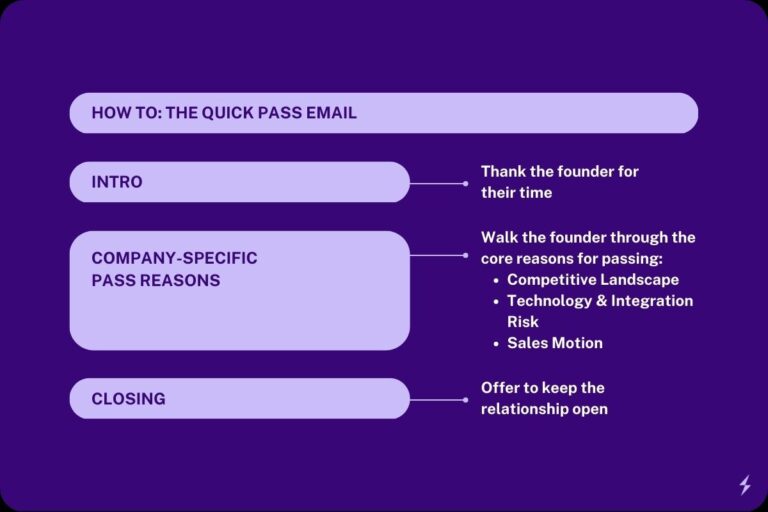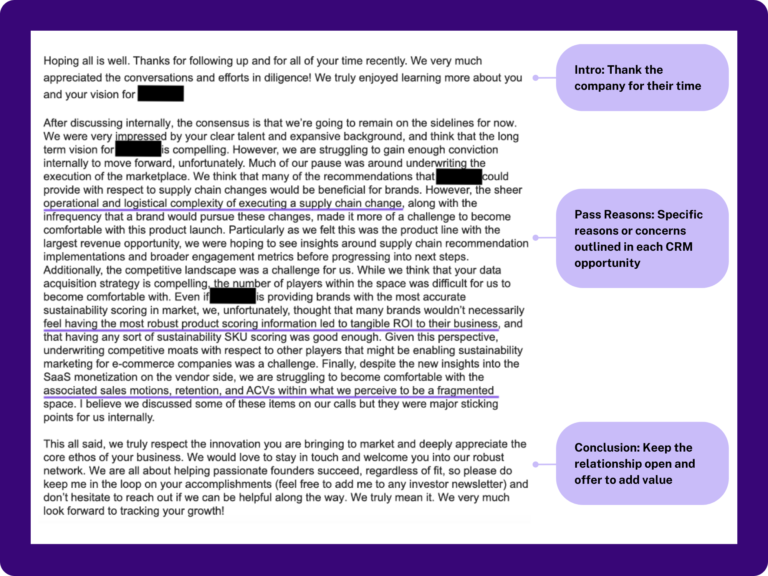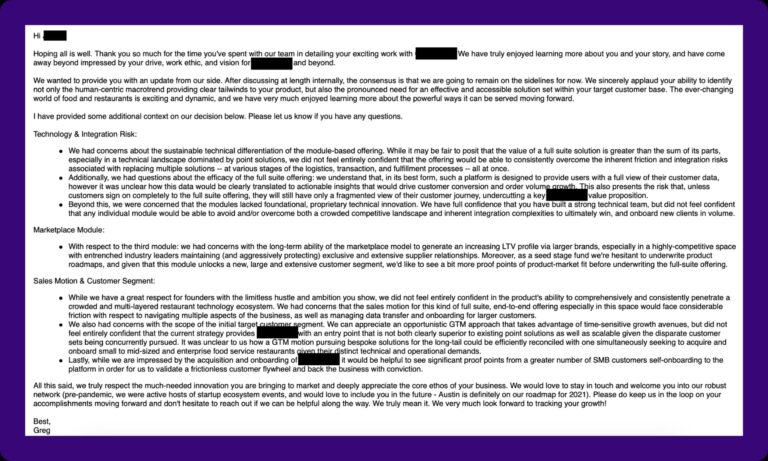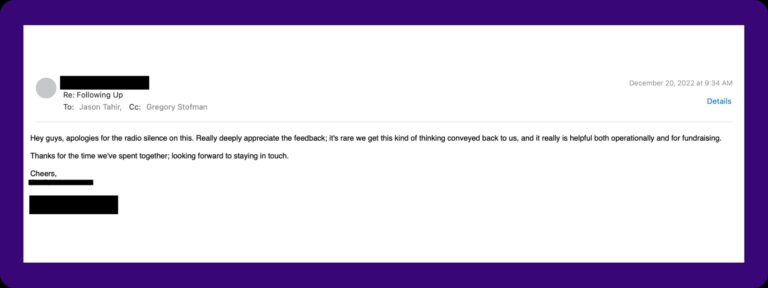Cracking the Code of Pass Emails: What VCs (And Founders) Need to Know

They’re not easy to read, but receiving pass emails is a natural part of every founder’s journey. As a VC, it’s crucial to write meaningful and honest pass emails that let founders know your reasons for not investing. However, VCs pass on thousands of deals per year, so writing thoughtful, personalized pass emails for every company can be extremely time consuming. While there are thousands of published VC content pieces that cover every vertical thesis, every market map, every how-to do x, y, and z for every corner of your business, etc. we find it ironic that there is almost no published content that covers what both VCs and founders spend a fair bit of their time doing – writing and digesting pass emails, respectively. Below, we share why VCs should prioritize writing thoughtful pass emails and provide insights from our experience around our best practices for crafting a scalable pass email process.
. . .
Why is writing a pass email so important?
As a VC, it’s always important to remember that meeting with founders is a privilege. Founders have taken their time to share a vision with you and it’s a best practice to provide them with an honest explanation for passing. Not only is contextualizing your reasons for passing just plain respectful, but by offering your input, you can give founders an opportunity to make improvements to their business and investor pitch. For founders, this guidance and input could be the pivotal piece of advice for them as they seek to find the right investor for their business. While receiving pass emails is disappointing for founders and writing pass emails for VCs can feel tedious, it’s crucial to understand the many benefits thoughtful pass emails can provide:
- Reputation – Writing a thoughtful pass email strengthens a VC’s reputation amongst the founder community. Building a positive reputation with founders, despite passing on their business, will pay dividends back to your firm in the future.
- Stay Top of Mind – Passing on a round doesn’t always mean the door is fully closed on a potential investment. A founder who had a positive experience with you during their previous fundraise might reach back out for their next round. For example, here at Struck, we invest in Pre-Seed and Seed stage companies. For a Pre-Seed company, we might find the founder quite compelling and think their idea has merit, but are waiting to see more product development, customer traction, or general business maturation before investing. Should an investor pass in a scenario like this, the depth and quality of the pass email demonstrates a thoroughness that the investor would approach the company relationship with in the future as a potential part of the cap table.
- Create a Virtuous Cycle – By cultivating a relationship with founders and providing valuable guidance from the get go, founders will be inclined to refer you to their founder network. The founder ecosystem is tight-knit and it’s very possible that a founder who had a great experience with you during diligence may introduce your firm to a deal that fits your investment criteria.
- A Positive Ecosystem – Treating people with respect and honesty is always the right thing to do. Writing thoughtful pass emails is one way to reinforce a positive ecosystem for founders and VCs.
If it’s so important, why doesn’t every VC do it?
Writing thorough pass emails is time consuming. VCs are taking introductory calls with dozens of companies and founders each week, and only a small subset move into the next steps of diligence which can cause a backlog of a week’s worth of pass emails to write. While most VCs recognize the importance of writing reflective pass emails, many avoid writing them due to the heavy administrative burden.
On the surface, these hurdles can make it seem reasonable and even justified to ghost a founder – but it’s not. Writing thoughtful pass emails doesn’t have to be tedious or painful. Here at Struck Capital, we’ve made the process easier by standardizing how we evaluate a company after our first conversation. We leverage our technology stack to memorialize key risks in real-time, while running an expedited process to validate key competitive differentiation. Separately, we’ve built email templates for our most common pass reasons. When you combine templated pass email infrastructure with a technology-driven process that identifies key company risks in real-time, you become structurally built to not only scale your ability to compose pass emails, but also decrease your turnaround time. It should also be said though that while we have built standardization and automation into our evaluation and pass email process, we also embed customized language around our pass reasons into each email to recognize and account for the unique and significant nuances each business possesses.
You’re ready to write your first pass email after an introductory call. Now what?
As you’ve probably noticed, there’s tons of content surrounding venture capital and the day-to-day responsibilities of an investor, but we haven’t seen much out there on the art of writing quality and quick pass emails. To get you started, below we have outlined a framework you can use for quick passes – when you decide to pass after an introductory call.
Start the email by thanking the founder for their time and reiterating that their hard work and dedication is impressive. Jumping into becoming a founder is no easy task! After the introductory paragraph, we then get into the bulk of our hesitations around the specific business at hand. This could be a crowded competitive landscape, limited insights on monetization and revenue, a lack of traction, a small TAM, or a host of other perceived risks that are relevant to the specific business at hand. This is where your pass reason memorialization process comes in handy, as they can be directly populated from your CRM of choice into the body of your email. Finally, look to close with an offer of keeping the relationship open. VCs might be able to introduce a founder to a fund that might be an industry expert within that founder’s market or connect them with a portfolio company that could benefit from their solution. It’s important to leave the lines of communication open, as the tech ecosystem is small and it’s important to be a good steward of each relationship.
And here is an example of an actual pass email we have written:
What if a company isn’t a pass after an introductory chat?
Should a company move forward in diligence, we will look to dive in deep with the founders on anything and everything related to their business. This includes follow-up conversations, longer form questionnaires, external calls, and calls with the entire Struck team. As you might imagine, this takes significant investment on the founder’s side to prepare responses, make introductions, and carve out time on their schedule to discuss everything live. This effort doesn’t go unappreciated by our team and ultimately serves as a bedrock for an investment decision.
The long-form pass email after a deep dive diligence process.
The importance of a well-thought out and thorough pass email is only magnified in these deeper diligence processes given a more substantive relationship has been built over time between the investor and a founder. As each company is unique, as you delve much more deeply into a company, it’s more difficult to standardize and automate this portion of the pass email process and it often requires the deal lead to write out a long-form email around our perceived risks to the business and the investment.
Try breaking out the pass reasons into broader themes to keep your thoughts cohesive and coherent. Was there friction in the GTM market process that gave you hesitations? Or maybe you felt like this was a nice-to-have product versus a must-have product for potential customers? Check out an example of how we like to structure our longer-form pass emails:
Is this even beneficial for founders? Don’t they have better things to do than read long pass emails from VCs?
Founders are used to hearing “no”, particularly in the early stages of company building, whether that is from investors, potential customers, or prospective employees. Hearing “no” so often can be numbing, however, the best founders are sponges for feedback. For many, they don’t get honest, actual feedback from prospective investors, so when they do get actionable feedback, it’s illuminating. Pass reasons from one investor could help them modify their fundraising narrative for future investor pitches, rethink their product strategy, and/or tweak their investor outreach to more appropriate funds. It’s been encouraging for us at Struck to get feedback from founders that the diligence process was a helpful experience for their business, with the detailed pass note serving as a clean, digestible summary of our thoughts on the business today.
Why invest so much time writing pass emails as a VC? Shouldn’t you be spending even more time with portfolio companies or finding the next investment?
It’s important to remember what your fund’s north star is. For Struck Capital, it’s finding strong ambitious founders working on game-changing technology and putting in the sweat equity to help these founders achieve their vision. This north star applies to all founders, not just to the one’s in our portfolio, and ultimately, we believe that whatever is beneficial to founders is positive for the tech ecosystem and us. By writing thorough pass emails, we believe that we can reinforce a positive environment for entrepreneurs. For investors starting their careers in VC, it’s critical to remember that investing is a long-term pursuit. Being overly transactional and short-sighted will come back to hurt your reputation in the long run.
Thoughtful pass emails can result in all types of short-term benefits too. Maybe you considered an investment at the pre-seed stage but we’re concerned about the willingness-to-pay of the customer segment. Eight months later that founder may come back to your fund when they prepare to raise their seed round and have quantifiable data disproving your initial risk. If you had not been forthcoming in your pass email or maybe even ghosted the founder, they wouldn’t think to contact you for the next fundraising round. On top of the future potential to work together, we’ve gotten intros to other founders from companies we have passed on. Generally being top of mind (in a positive way) for founders is a good thing!
Ready to write your next pass email? Go for it!
We’re not going to sugarcoat it for you, pass emails are no fun to write for VCs and getting rejected hurts. Early-stage startups are all about growth and optimism, so it’s never easy telling someone that you don’t want to invest in their company or get behind their vision. While writing pass emails may feel tedious and difficult in the moment, it’s crucial to remember the positive and long-term halo effect you can create by taking the time to write thoughtful pass emails and the benefits they can deliver for founders and the broader tech ecosystem. We hope you can take some of the best practices we shared and make them your own, so that you can build a scalable process for your firm as well.
Disclaimer:
Struck Capital Management LLC is registered with the United States Securities and Exchange Commission (“SEC”) as a Registered Investment Adviser (“RIA”). Nothing in this communication should be considered a specific recommendation to buy, sell, or hold a particular security or investment. Past performance of an investment does not guarantee future results. All investments carry risk, including loss of principal.




